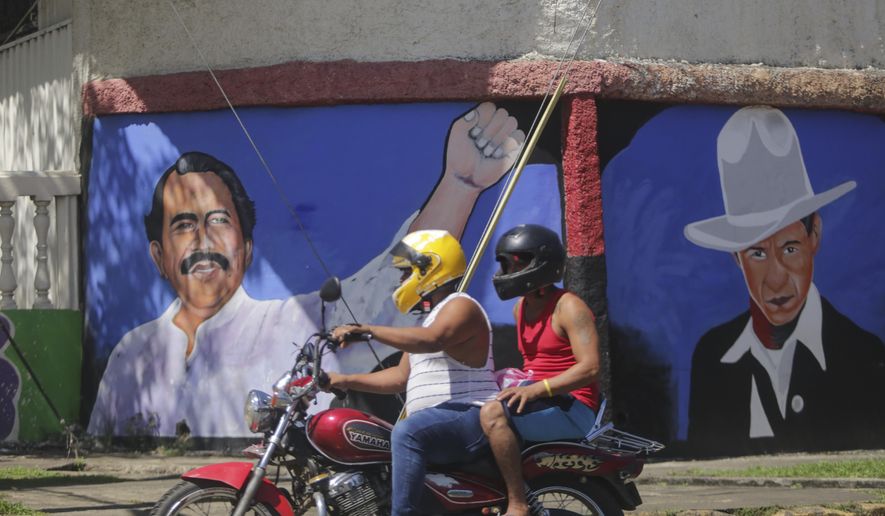MANAGUA, Nicaragua (AP) — Nicaraguan President Daniel Ortega sought a fourth consecutive term in elections the United States has called a “pantomime” following the jailing of his top rivals and the country’s opposition has urged voters to boycott.
Ortega has railed against alleged interference by Washington in Sunday’s elections to determine who holds the presidency for the next five years, as well as 90 of the 92 seats in the congress and Nicaragua’s representation in the Central American Parliament.
The ruling Sandinista Front and its allies control the congress and all government institutions. Ortega first served as president from 1985 to 1990, before returning to power in 2007. He recently declared his wife, Vice President Rosario Murillo, his “co-president.”
Voting was orderly and closed Sunday evening without reported incidents. Provisional vote totals were expected Monday.
The opposition had called on Nicaraguans to stay home in protest of an electoral process that has been roundly criticized as not credible by foreign powers. In June, police arrested seven potential presidential challengers to Ortega on charges that essentially amount to treason. They remained in detention on election day. Some two dozen other opposition leaders were also swept up ahead of the elections.
The remaining contenders on Sunday’s ballot were little known politicians from minor parties seen as friendly with Ortega’s Sandinista Front.
On Saturday, the Blue and White National Union, an opposition alliance, issued an alert after at least eight of its leaders were “abducted by the regime in illegal raids” Saturday afternoon and evening.
The Civic Alliance, another opposition coalition, reported “harassment, surveillance, intimidation, assault, attacks, illegal and arbitrary detentions” of some of its leaders around Nicaragua.
On Sunday, Mayela Rodríguez found her local voting center at a school in Managua virtually empty. “In past years it was really full,” she said. “Before you had to (wait) in a big line to come here and now, empty.”
Around midday, Ortega spoke live on television after voting — he held up his inked finger.
He blasted the United States for interference in Nicaragua, noted there had been alleged fraud in the last U.S. election, reminded that those who stormed the U.S. Capitol were called terrorists and remain jailed. He repeated his claim that the U.S. government supported huge protests in Nicaragua in April 2018, which he has called an attempted coup.
“They have as much right as we do to open trials against terrorists,” Ortega said.
In a statement released around the close of voting, U.S. President Joe Biden called Nicaragua’s election process “rigged” and said the U.S. would use the tools at its disposal to hold the Nicaraguan government accountable.
“The Ortega and Murillo family now rule Nicaragua as autocrats, no different from the Somoza family that Ortega and the Sandinistas fought four decades ago,” Biden said.
He criticized the vote as a “pantomime election that was neither free nor fair, and most certainly not democratic.”
In neighboring Costa Rica, President Carlos Alvarado Quesada tweeted that his government won’t recognize the election because of “the lack of democratic conditions and guarantees.”
Nicaraguan Foreign Minister Denis Moncada said the peaceful vote sends a message to the world powers that “Nicaraguans are dignified patriots and we are not going to bend to their threats, sanctions and non-recognition of the elections.”
With little doubt as to the presidential election result, focus is already turning to what the international response will be as Ortega seeks to tighten his grip on power.
The United States and European Union have imposed sanctions against those in Ortega’s inner circle, but Ortega responded only by arresting more of his opponents.
On Friday, a senior U.S. State Department official, who spoke with reporters on the condition of anonymity, said the U.S. government was willing to consider additional targeted sanctions, but had tried to avoid measures that would more broadly impact the Nicaraguan people.
“It is very hard when you have a government that has very minimal goals that include remaining in power at any cost and disregarding the will of their own citizens or the needs of the citizens to retain that power,” the official said.
The Organization of American States will hold its annual general assembly in Guatemala later this week. Guatemala, Honduras and Mexico were among seven countries that abstained from a vote on a resolution last month in the OAS condemning the repression in Nicaragua.
International observers present for past Nicaraguan elections were not present. Instead, the government accredited 232 “electoral companions,” mostly from leftist governments and parties.
Among them was Dmitry Novikov, representative of Russia’s Duma. He visited several polling places and said he observed “respect for the principal of non interference” and criticized European leaders who questioned the election.
Gerardo Berthin, director of Latin American and Caribbean programs for the democracy promotion organization Freedom House, said Sunday the vote was going as scripted by Ortega.
“This is what they want in terms of showing people voting, even though we know that they have lists actually of people who work for the government and they are checking who’s going and who is not,” Berthin said.
___
Associated Press writers Christopher Sherman in Mexico City and Javier Cordoba in San Jose, Costa Rica, contributed to this report.




Please read our comment policy before commenting.